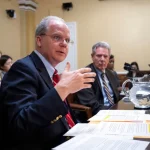

House Foreign Affairs Committee chair Rep. Michael McCaul (R-TX) led several Republican lawmakers Tuesday on a trip to Ukraine where they expressed their support to President Volodymyr Zelensky and conducted oversight of military equipment.
Their meeting with Zelensky, as well as other Ukrainian officials, occurred in Kyiv, where Zelensky laid out a wish list of more powerful military items he said Ukraine needs for its war with Russia, according to a Foreign Affairs Committee spokeswoman who provided Breitbart News with details of the trip and excerpts of remarks that McCaul later gave at a press conference there.
McCaul, who was joined by Reps. Keith Self (R-TX), Max Miller (R-OH), Darrell Issa (R-CA), and Jake Ellzey (R-TX), said at the press conference the meeting with Zelensky was “very productive.”
Thank you Chairman @RepMcCaul, Congressmen @DarrellIssa, @RepKeithSelf, @MaxMillerOH, @JakeEllzey for your visit to Kyiv, meeting with President @ZelenskyyUa, and for important signals of support to Ukraine, and our fight for Freedom! Together we win 🇺🇺🇸 pic.twitter.com/yVJtIQpKOU
— Oksana Markarova (@OMarkarova) February 21, 2023
The war in Ukraine has been devastating for the people of Ukraine and costly for the United States. Putin’s invasion must be brought to an end, and any further aid should be directed at achieving that result on the battlefield. I appreciate @ZelenskyyUa for briefing us today. pic.twitter.com/FyaRN4rDWB
— Congressman Max Miller (@RepMaxMiller) February 21, 2023
Congressman Keith Self is in Kyiv, Ukraine with House Foreign Affairs Committee Chairman Michael McCaul to see firsthand what is happening on the ground in Ukraine. pic.twitter.com/TklL3NhCkz
— Rep. Keith Self (@RepKeithSelf) February 21, 2023
“We talked primarily about what [Zelensky’s] needs are when it comes to winning this war,” McCaul said, noting Zelensky would provide the Republicans with his list of desired items.
McCaul continued:
Primarily, he needs the longer-range artillery, also known as ATACMS, that can go all the way into Crimea to take out the Iranian drones that are causing so many problems throughout Ukraine – [hitting] power [infrastructure] and killing innocent civilians. He also needs air-to-surface systems including aircrafts like the F-16.
…
We have strong bipartisan support to give Ukraine everything that it needs to win.
The congressmen’s visit comes one day after Biden also made an unannounced appearance in Ukraine, which drew backlash mostly from Republicans who feel Biden has prioritized the foreign nation over pressing issues at home, such as the toxic train wreck in Ohio, the southern border crisis, and crippling economic inflation.
Issa, who was with the congressional delegation and supports aiding Ukraine, deemed Biden’s visit a “strategic failure” because, he said, the president failed to provide any new “plans” or “clarity” about where America stands policy-wise on Ukraine.
McCaul, for his part, has criticized Biden for being “too slow” at sending weapons to Ukraine, warning in a recent CNN interview that Biden’s perceived lack of urgency helps Russian President Vladimir Putin, who “wants this to be a long, protracted war because he knows that potentially we could lose the will of the American people and therefore the Congress.”
Biden’s and the Republicans’ trips come right around the one-year mark of Russia invading Ukraine, though conflict between the two countries first began in 2014 and picked back up last February with what Russia described as a “special operation.”
After the past year of the U.S. government heavily investing in Ukraine’s fight, Americans do indeed appear to be becoming less supportive of the matter and more divided over it.
A Pew Research survey conducted January 18–24 found that over the past year, the percentage of those who believe the U.S. is providing “too much” aid to Ukraine has increased by 19 percent. Though factions of both Republicans and Democrats believe the aid is too much, 40 percent of Republicans feel that way compared to 15 percent of Democrats. The sentiment that the aid is too much has only grown among both parties since last year.
In 2022, American taxpayers gave Ukraine nearly $50 billion in aid, according to one estimate.
That figure has only shown signs of growing. Biden announced on his visit Monday that Americans would continue to fund the war for “as long as it takes” and that he would be sending Ukraine nearly half a billion taxpayer dollars more in aid.
Coinciding with Americans’ weakening support for funding Ukraine and the varying criticisms of Biden from Congress, foreign policy experts are concerned about the president’s apparent lack of strategy specifics.
House Speaker Kevin McCarthy (R-CA) has warned that the House will not continue to support writing a “blank check” to Ukraine, and 11 House Republicans, led by Rep. Matt Gaetz (R-FL), are backing a “Ukraine Fatigue Resolution” to end all funding to Ukraine and urge the warring nations to reach a peace agreement.
No more aid for Ukraine!
Thank you to ALL original co-sponsors for supporting my Ukraine Fatigue Resolution:
1. @RepAndyBiggsAZ
2. @LaurenBoebert
3. @RepGosar
4. @RepMTG
5. @RepLuna
6. @RepThomasMassie
7. @RepMaryMiller
8. @RepBarryMoore
9. https://t.co/XET6REEyCp… https://t.co/WBDUwzBDmU— Rep. Matt Gaetz (@RepMattGaetz) February 20, 2023
Write to Ashley Oliver at [email protected]. Follow her on Twitter at @asholiver.





